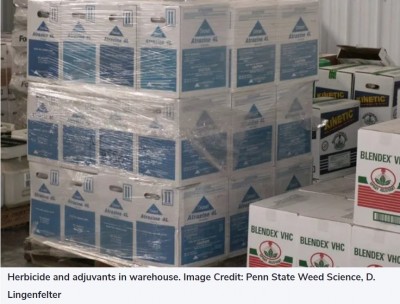Herbicide Supplies and Storage during the Winter

By Dwight Lingenfelter: Penn State Extension
Again, this year, there is a lot of speculation about potential herbicide shortages and price increases on some products for the 2023 growing season. Overall, it does not seem as grim as last year, but indications are that supplies of glyphosate (Roundup, others) and metribuzin should be adequate but likely not back to levels and costs prior to the pandemic. Products such as glufosinate (Liberty, others), metolachlor (plus other group 15 herbicides), atrazine, dicamba, and 2,4-D might be in shorter supply and with higher prices. Also, some products that are packaged in smaller sizes (e.g., 2.5-gallon jugs) might be limited but other sizes such as totes should be more readily available. Furthermore, with volatile supply chain issues involving many aspects of production ag these days, some are asking if it is wise to purchase bulk inventory of herbicides and/or other pesticides. The short answer is yes, if it makes sense economically, it could be a good idea to start making purchases on some of these inputs. Begin now by working with your dealer to discuss these issues. The intent is not to stockpile products but to have a modest supply for use during the next growing season. However, you must keep in mind appropriate storage parameters, namely issues regarding freezing of pesticide products during the winter months. In general, freezing temperatures can change and negatively affect the chemistry of some pesticides inside the container and can also damage the container itself. Premixed liquid products that contain multiple active ingredients seem to be affected more so by low temperatures than single active ingredient products. Some premixes tend to separate in the container and can be difficult to get back into a homogeneous liquid prior to use in the spring. Make sure to read the label for storage instructions. But as a general rule, pesticides are best stored between 40-90°F. For more details and many useful links, please refer to the National Pesticide Information Center's Storage of Pesticides webpage. Another good resource is Penn State's Effect of Cold Temperatures on Pesticides article.
Upcoming Events
Boots in the Barn: Cornell Dairy Research Updates
January 13, 2026
January 20, 2026
January 27, 2026
February 3, 2026
February 10, 2026
February 17, 2026
February 24, 2026
Join us for some or all!
New York Certified Organic (NYCO) Field Crops and Dairy Meeting
February 10, 2026
Geneva, NY
Piglet Health 101
February 13, 2026 : Piglet Health 101 - Batavia, NY
Batavia, NY
This free workshop from the New York Pork Producers offers hands-on training in essential piglet care and processing practices, led by industry veterinarians from Passion for Pigs. No matter your experience level, this training offers takeaways for both new and experienced producers.
Announcements
Cows, Crops & Critters Newsletter Sponsorship
TRYING TO REACH GROWERS AND AGRIBUSINESSES IN OUR SOUTHWEST REGION OF NEW YORK?Weekly Email Update: Shared with 625+ households who have signed up with our program.
Monthly Paper Mailer: To reach our stakeholders and farmers who lack internet access, we send out a monthly mailer where your company's logo and contact information would be featured with a mailing list of 330+ households.
If you sponsor our weekly and monthly publications you reach approximately 955 households.





